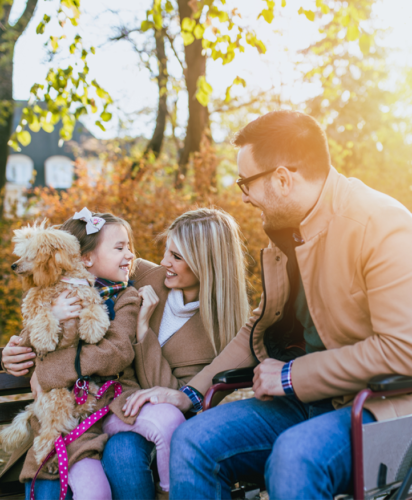
Summary
Informal carers are people who provide (usually) unpaid care to someone with a chronic illness, disability or other long-lasting health or care need, outside a professional or formal framework – for example, the family and friends of a person diagnosed with cancer.1 Balancing the demands of everyday life with those of being an informal carer is difficult, and carers for people with cancer often receive inadequate support to navigate this process. Advocacy group Eurocarers has designed a toolkit to support and guide informal carers for people with cancer.2 The toolkit outlines the different phases of cancer and includes advice on coping with caregiving, maintaining a good level of wellbeing, and balancing caregiving with work. Eurocarers has also published country-specific information sheets outlining carers’ rights and sources for support in Belgium, Estonia, Finland, France, Germany, Ireland, Italy, Slovenia, Sweden and Portugal.3
Challenge
The responsibility of caring for a loved one diagnosed with a long-term condition, such as cancer, often falls on informal carers – people who provide (usually) unpaid care to someone with a chronic illness, disability or other long-lasting health or care need, outside a professional or formal framework.1 Informal carers, often friends or family, are increasingly important for healthcare systems due to the growing incidence of age-related conditions, increased demand for long-term care and workforce shortages in the health and social care sectors. In Europe alone, it is estimated that over 100 million informal carers provide roughly 80% of long-term care across all diseases.1
Carers for people with cancer may not receive adequate support, as most cancer care focuses on the needs of the person with cancer.4 Carers face many challenges, including the management of transport, housework, finances and job security, childcare, social identity and changing relationships, feelings of helplessness and worries about the future.4 5 Compared with non-carers, carers for people with cancer are at a higher risk of depression, anxiety, insomnia and migraines.6 They also have a poorer quality of life, more frequent absences from work and increased healthcare use (more hospitalisations and health professional visits). These issues affect the wellbeing and health of informal carers, as well as their ability to care for their loved ones.
Solution
One solution to the lack of support for informal carers in Europe has been developed by Eurocarers, an evidence-based advocacy group for informal carers. It created an essential care and cancer toolkit to educate carers about cancer, help carers come to terms with their situation and encourage them to evaluate their needs and seek help.2 The toolkit is based on research and input from carers, people with cancer and healthcare professionals across the European Union. Eurocarers has also published country-specific information sheets outlining carers’ rights and sources for support, such as local carer organisations, in Belgium, Estonia, Finland, France, Germany, Ireland, Italy, Slovenia, Sweden and Portugal.3 All materials are available for download on the Eurocarers website.
The Eurocarers cancer toolkit includes advice on:
- coping with caregiving, including information on cancer and cancer treatment, managing stigma and uncertainty, identifying and acting on support needs and the importance of self-care
- maintaining a good level of wellbeing, including guidance for physical and mental health, stress, depression and relaxation
- caring and working, outlining carers’ rights at work, alternative work arrangements (e.g. flexible hours or working from home), considerations when quitting a job, additional sources of support (e.g. carer organisations), and tips for communicating with employers and returning to work
- the different phases of the disease, including finding the right treatment and information; making informed treatment choices; considering side effects, treatment at home and clinical trials; eating well; communicating with healthcare professionals; maintaining relationships beyond cancer; coping with financial burden; managing life after cancer; and navigating palliative care.2
What has it achieved?
Since publishing the toolkit in 2018, Eurocarers has translated it into Finnish, French, German, Italian, Portuguese, Slovenian and Swedish.2 The toolkit is an ongoing initiative, and its impact on the lives of informal carers and clinical practice has not yet been reviewed.
Next steps
- The Eurocarers website
- The Eurocarers cancer toolkit website
- The country-specific information sheets for informal carers of people with cancer
Further information
- The Eurocarers website
- The Eurocarers cancer toolkit website
- The country-specific information sheets for informal carers of people with cancer
References:
- Eurocarers. About carers. Available here: https://eurocarers.org/about-carers/ [accessed: August 2019]
- Eurocarers. The essential care and cancer toolkit. Available here: https://www.eurocarers-cancer-toolkit.eu/ [accessed: March 2019]
- Eurocarers. The essential care and cancer toolkit: country sheets. Available here: https://www.eurocarers-cancer-toolkit.eu/country-sheets/ [accessed: August 2019]
- Soothill K, Morris SM, Harman JC, et al. 2001. Informal carers of cancer patients: what are their unmet psychosocial needs? Health & Social Care in the Community 9(6): 464-75
- Thomas C, Morris SM, Harman JC. 2002. Companions through cancer: the care given by informal carers in cancer contexts. Social Science & Medicine 54(4): 529-44
- Goren A, Gilloteau I, Lees M, et al. 2014. Quantifying the burden of informal caregiving for patients with cancer in Europe. Supportive Care in Cancer 22(6): 1637-46